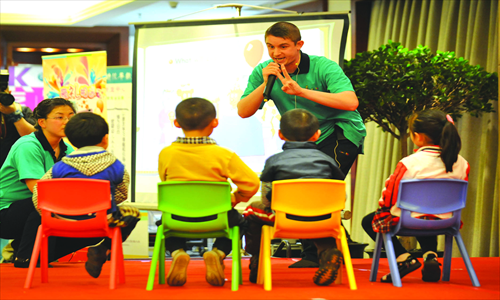Spice up the classroom


An English textbook can be perhaps the most boring book in the world. Sadly all Chinese students need to learn in this old-fashioned way. Grammar and usage evolve, but the English textbooks stay the same. "What are your expectations for the 2008 Beijing Olympic Games?" remains a discussion topic in college oral English textbooks, even though the 2012 London Olympic Games have already come and gone.
Albert Einstein once said interest is the best teacher, and a few fresh faces to the English teaching scene have taken this to heart. Ditching the old-school ways of teaching English, these independent voices stand out from Beijing's massive English-teacher crowd. They take up musical instruments, make their own textbook or shoot video clips that teach slang. Perhaps they can inspire you, too, to add vitality to your own English lessons.
Write an updated textbook
As a language, English is changing all the time. Years ago, there was no smartphone nor bootylicious. English textbooks published years ago cannot meet the demands of today, so college English teacher Shi Bing from Beijing Forestry University wrote his own English textbook which includes hot, new words that come from news happening now.
"The current English textbooks cannot attract students any more, and once students graduate from college they will probably remember nothing, so I came up with the idea of writing my own. I used news on the TV or in newspapers as ingredients," Shi said.
At the end of each day, Shi rewrites English lessons using the latest news stories. When the Yangchenghu fake crab story came out, Shi brought in a crab he bought at the local seafood market to the class that day to help the lesson stick with his students.
Many of Shi's students share pictures of his textbooks online. "I hope my teacher can continue to make his textbooks in the future," said Wang Junqi, a student of Shi.
Shoot a video mimicking Lady Gaga
Jessica Beinecke, 26, better known by her Chinese name Bai Jie, is an American who posted a series of video clips online to teach American slang. Beinecke works for Voice of America's Mandarin language program with the show OMG! Meiyu. Each show is about two to three minutes long, with one theme or one slang phrase.
In the video clips, Beinecke teaches people the slang in both English and Chinese, repeating it several times with exaggerated facial expressions and gestures. She does whatever will help audiences memorize the phrases, from Lady Gaga dances to pop song covers.
Her video clips have attracted thousands of followers because the content she teaches is useful and easy to learn. At the end of each clip, Beinecke tells her students to give her feedback and asks for suggestions on what they want to learn in the next clip. OMG! Meiyu also has a smartphone app now, encouraging even more people to enjoy the fun of learning English.
Harness the sound of music
Music is a borderless language. Sarah Peel, from Canada, who started teaching in 2000, believes that music has strong connections to language and memory and is an excellent tool to help English learners start using their new language skills. By singing songs, Peel helps her students practice new vocabulary and pronunciation.
"Many new learners who are hesitant to speak, especially those who fear making mistakes, are more comfortable expressing themselves in a second language while singing," Peel said.
In 2006, after she became a licensed Kindermusik teacher, Peel moved to Beijing and spent the next six years offering music and movement classes for infants and children up to seven years old, and now she is a preschool teacher for Muffy's Kindergarten, an English-language immersion school for local Chinese children. Music and songs are an all-day fixture in her classroom.
"Both music and language share a similar structure, following set rules. Recent research on brain structure and function has proven that music and language are processed in similar areas of the brain and in remarkably similar ways," Peel said.
She also pointed out that young children under the age of 7 do not approach language as adults do and they don't need the same grammar instruction.
"They learn a new language best through immersive activities like music, art, cooking and play that stimulate all of their areas of intelligence, not strict, language-specific instruction," Peel said.
Play Pictionary
The app Pictionary is popular among young people because they can enjoy learning an English word while drawing a picture to describe it. It's easier for people to remember what they learned with pictures, so English teacher Natalie Litofsky, from the US, decided to put it into her lessons.
Litofsky worked at Beijing Jingshan School in Dongcheng district from 2005 to 2006 and taught both middle school and high school students. Her teaching method was focused on helping students improve their oral English.
Litofsky used a lot of visual aids in teaching to start conversations. With her younger students, for example, she would bring in pages from magazines and had the students describe what they saw in the pictures. "I would ask them to be specific about colors, textures, size and so on," she said.
As for her older students, her favorite activity involved teaching them idioms because Americans especially tend to use idioms in their daily speech, but they can be confusing for non-native speakers to understand.
For example, Litosfsky would break her students into pairs and gave them each a piece of paper with an idiom such as "she fell head over heels" written on it. Then she would ask students to draw a picture of what they thought the phrase meant and present it to the class.
"This method helped me learn what they literally interpreted from the phrase and it also was a fun way for them to learn what the phrases actually meant afterward," Litofsky said.